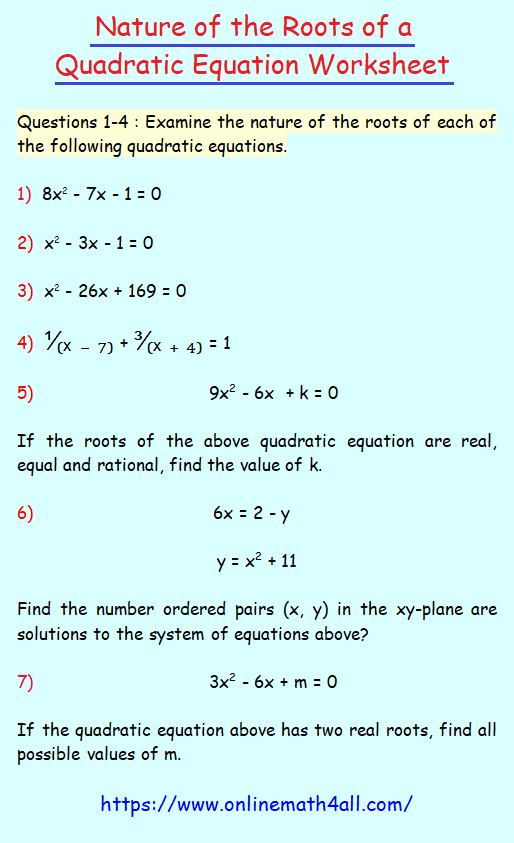NATURE OF THE ROOTS OF A QUADRATIC EQUATION WORKSHEET
Subscribe to our ▶️ YouTube channel 🔴 for the latest videos, updates, and tips.
Problems 1-5 : Examine the nature of the roots of the quadratic equation.
Problem 1 :
x2 + 5x + 6 = 0
Problem 2 :
2x2 - 3x - 1 = 0
Problem 3 :
x2 - 16x + 64 = 0
Problem 4 :
x2 - 5x = 2(5x + 1)
Problem 5 :
Problem 6 :
If the roots of the equation 2x2 + 8x - m3 = 0 are equal, then find the value of m.
Problem 7 :
If the roots of the equation x2 - (p + 4)x + 2p + 5 = 0 are equal, then find the value of p.
Problem 8 :
If the roots of the equation x2 + (2s - 1)x + s2 = 0 are real, then find the value of a.
Problem 9 :
If the roots of the equation x2 - 16x + k = 0 are real and equal, then find the value of k.
Problem 10 :
x = 1 - 2y
4y = x2 + 3
How many ordered pairs (x, y) in the xy-plane are solutions to the system of equations above?
A) 0
B) 1
C) 2
D) Infinitely Many

Answers
1. Answer :
x2 + 5x + 6 = 0
The given quadratic equation is in general form
ax2 + bx + c = 0
Then, we have a = 1, b = 5 and c = 6.
Find the value of the discriminant b2 - 4ac.
b2 - 4ac = 52 - 4(1)(6)
b2 - 4ac = 25 - 24
b2 - 4ac = 1
Here, b2 - 4ac > 0 and also a perfect square.
So, the roots are real, unequal and rational.
2. Answer :
2x2 - 3x - 1 = 0
The given quadratic equation is in general form
ax2 + bx + c = 0
Then, we have a = 2, b = -3 and c = -1.
Find the value of the discriminant b2 - 4ac.
b2 - 4ac = (-3)2 - 4(2)(-1)
b2 - 4ac = 9 + 8
b2 - 4ac = 17
Here, b2 - 4ac > 0, but not a perfect square.
So, the roots are real, unequal and irrational.
3. Answer :
x2 - 16x + 64 = 0
The given quadratic equation is in general form
ax2 + bx + c = 0
Then, we have a = 1, b = -16 and c = 64.
Find the value of the discriminant b2 - 4ac.
b2 - 4ac = (-16)2 - 4(1)(64)
b2 - 4ac = 256 - 256
b2 - 4ac = 0
So, the roots are real, equal and rational.
4. Answer :
x2 - 5x = 2(5x + 1)
The given quadratic equation is not in general form.
First, write the given quadratic equation in the general form.
x2 - 5x = 2(5x + 1)
x2 - 5x = 10x + 2
x2 - 15x - 2 = 0
Now, the quadratic equation is in general form
ax2 + bx + c = 0
Then, we have a = 1, b = -15 and c = -2.
Find the value of the discriminant b2 - 4ac.
b2 - 4ac = (-15)2 - 4(1)(-2)
b2 - 4ac = 225 + 8
b2 - 4ac = 233
Here, b2 - 4ac > 0, but not a perfect square.
So, the roots are real, unequal and irrational.
5. Answer :
The given quadratic equation is not in general form.
First, write the given quadratic equation in general form.
Multiply both sides by (x2 - 3x - 4).
3x - 2 = 2(x2 - 3x - 4)
3x - 2 = 2x2 - 6x - 8
2x2 - 9x - 6 = 0
Now, the quadratic equation is in general form
ax2 + bx + c = 0
Then, we have a = 2, b = -9 and c = -6.
Find the value of the discriminant b2 - 4ac.
b2 - 4ac = (-9)2 - 4(2)(-6)
b2 - 4ac = 81 + 48
b2 - 4ac = 129
Here, b2 - 4ac > 0, but not a perfect square.
So, the roots are real, unequal and irrational.
6. Answer :
2x2 + 8x - m3 = 0
The given quadratic equation is in general form
ax2 + bx + c = 0
Then, we have a = 2, b = 8 and c = -m3.
Because the roots of the given equation are equal,
b2 - 4ac = 0
82 - 4(2)(-m3) = 0
64 + 8m3 = 0
Subtract 64 from each side.
8m3 = -64
Divide each side by 8.
m3 = -8
m3 = (-2)3
m = -2.
So, the value of m is -2.
7. Answer :
x2 - (p + 4)x + 2p + 5 = 0
The given quadratic equation is in general form
ax2 + bx + c = 0
Then, we have a = 1, b = -(p + 4) and c = (2p + 5).
Because the roots of the given equation are equal,
b2 - 4ac = 0
[-(p + 4)]2 - 4(1)(2p + 5) = 0
Simplify.
(p + 4)2 - 4(2p + 5) = 0
p2 + 8p + 16 -8p -20 = 0
p2 - 4 = 0
p2 - 22 = 0
(p + 2)(p - 2) = 0
p + 2 = 0 or p - 2 = 0
p = -2 or p = 2
So, the value of p is ±2.
8. Answer :
x2 + (2s - 1)x + s2 = 0
The given quadratic equation is in general form
ax2 + bx + c = 0
Then, we have a = 1, b = (2s - 1) and c = s2.
Because the roots of the given equation are equal,
b2 - 4ac ≥ 0
(2s - 1)2 - 4(1)(s2) ≥ 0
Simplify.
4s2 - 4s + 1 - 4s2 ≥ 0
-4s + 1 ≥ 0
-4s ≥ -1
Divide each side by -4.
s ≤ 1/4
So, the value of s is less than or equal to 1/4.
Note :
Whenever we multiply or divide both sides of an inequality by a negative number, we have to flip the inequality sign.
9. Answer :
x2 - 16x + k = 0
The given quadratic equation is in general form
ax2 + bx + c = 0
Then, we have a = 1, b = -16 and c = k.
Because the roots of the given equation are equal,
b2 - 4ac = 0
(-16)2 - 4(1)(k) = 0
256 - 4k = 0
Subtract 256 from each side.
-4k = -256
Divide each side by -4.
k = 64
10. Answer :
x = 1 - 2y ----(1)
4y = x2 + 3 ----(2)
(1) :
x = 1 - 2y
Add 2y to both sides.
x + 2y = 1
Subtract x from both sides.
2y = 1 - x
Multiply both sides by 2.
4y = 2 - 2x
Substitute 4y = 2 - 2x in (2).
2 - 2x = x2 + 3
x2 + 2x + 1 = 0
Comparing ax2 + bx + c = 0 and x2 + 2x + 1 = 0,
a = 1, b = 2 and c = 1
Find the value of the discriminant b2 - 4ac.
b2 - 4ac = 22 - 4(1)(1)
b2 - 4ac = 4 - 4
b2 - 4ac = 0
Here, b2 - 4ac = 0.
So, the roots are real and equal. It means, there is only one real value for x. Hence, we will have only one real value for y.
Therefore, only one ordered pair (x, y) in the xy-plane is solution to the given system of equations.
The correct answer choice is (B).

Click here to get detailed answers for the above questions.
Subscribe to our ▶️ YouTube channel 🔴 for the latest videos, updates, and tips.
Kindly mail your feedback to v4formath@gmail.com
We always appreciate your feedback.
About Us | Contact Us | Privacy Policy
©All rights reserved. onlinemath4all.com

Recent Articles
-
10 Hard SAT Math Questions (Part - 38)
Dec 29, 25 04:21 AM
10 Hard SAT Math Questions (Part - 38) -
10 Hard SAT Math Questions (Part - 39)
Dec 28, 25 11:20 PM
10 Hard SAT Math Questions (Part - 39) -
10 Hard SAT Math Questions (Part - 41)
Dec 28, 25 06:05 PM
10 Hard SAT Math Questions (Part - 41)

